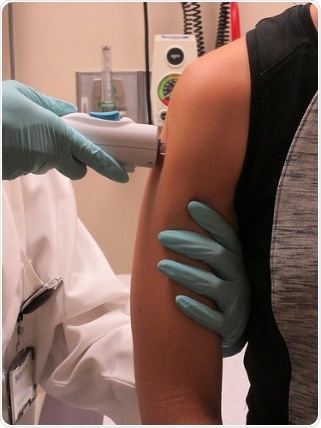Jan 25 2019
Immune cells called CD4+ T cells could be important mediators of protection against the Zika virus, according to a study published January 24 in the open-access journal PLOS Pathogens by Sujan Shresta of the La Jolla Institute for Allergy and Immunology, and colleagues. The findings support vaccine strategies that induce a protective CD4+ T cell response to the Zika virus.

Zika Virus Investigational DNA Vaccine. Credit: flickr, NIAID. CC BY 2
Several vaccine candidates are currently under development for Zika virus infection, which causes life-threatening neurologic diseases, including congenital Zika syndrome in neonates and Guillain-Barré syndrome in adults. However, the mechanisms by which the immune system contributes to protection against the Zika virus have not been fully investigated. To address this gap in knowledge, Shresta and colleagues used mouse models of intravenous and sexually transmitted (intravaginal) Zika virus infection to evaluate the role of CD4+ T cells in regulating antiviral responses and in controlling infection.
The results demonstrated that CD4+ T cells are required for the local control of viral infection in the lower female reproductive tract in mice infected intravaginally. Moreover, memory CD4+ T cells can confer protection against a lethal dose of the Zika virus after intravaginal infection. By contrast, CD4+ T cells are not necessary for the control of Zika virus infection via the intravenous route. According to the authors, future studies should help to identify the precise features of the CD4+ T cell response that can be manipulated to generate Zika virus vaccines that are safe and effective against infection in multiple contexts, including pregnancy and sexual transmission.
Shresta adds:
Depending on the tissue, the CD4 T cell phenotype and mechanism of protection against ZIKV may vary—this is important, as CD4 T cells are highly heterogeneous/plastic and consist of multiple subtypes, such as Th1, Th2, Tfh, and cytotoxic CD4 T cells.”